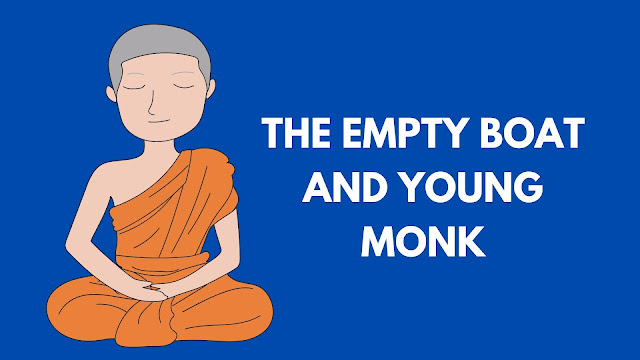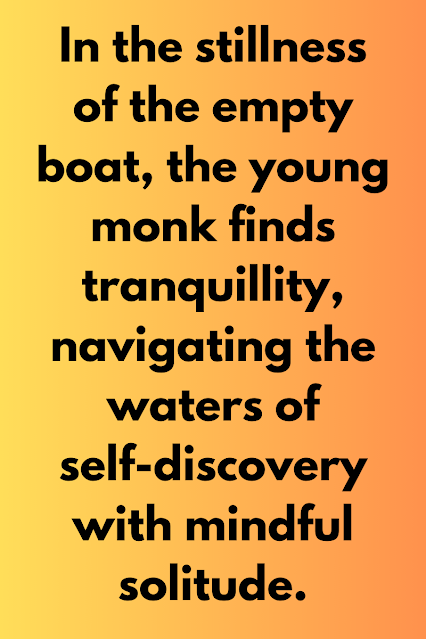Introduction Leadership is often painted as a position of authority, influence, and admiration. Titles, corner offices, and decision-making power can easily create the illusion that leadership is about control. In reality, most leadership challenges don’t begin with systems, strategies, or people—they begin in the mirror. The uncomfortable truth is that when a team struggles, it is rarely because of a lack of talent. More often, it reflects gaps in leadership awareness, communication, or courage. True leadership requires the willingness to confront difficult truths about oneself. Growth does not happen when leaders blame circumstances or people; it happens when they pause, reflect, and take responsibility. The following wake-up calls are not easy to accept, but they are necessary for anyone who wants to lead with impact, integrity, and lasting influence. 1. If Your Team Is Failing, It Starts With You When performance dips or morale drops, ...
Introduction
A long time ago, a young Zen monk lived in a little monastery in the forest by a small lake. The monastery was occupied by a few older monks, but the remainder were beginners who still needed to learn. The monks had numerous tasks at the monastery, but one of the most essential was their daily routine, which required them to sit down, close their eyes, and meditate. The monk struggled to focus during his meditation practice for several reasons, which irritated him. After that, I concentrated in quiet for hours at a time. After each meditation, they were to report back to their mentor on their development.
Anger of a Young Monk
When the young monk reported his progress, or lack thereof, to his mentor, the senior monk asked him a simple question with a hidden lesson: "Do you know what is making you angry?"
The young monk responded, "Well, normally, as soon as I close my eyes and begin to meditate, someone moves around and I lose focus. I am angry when someone disturbs me even when they are aware that I am meditating. How couldn't they be more considerate? When I close my eyes again and try to focus, a cat or a tiny animal may pass by and distract me again.
At first glance, the object of the novice monk's anger seemed to be external – an arrogant fellow monk who constantly berated and belittled him. However, the master encouraged the novice to look deeper, beyond the apparent cause of his anger. In the stillness of the monastery, the master guided the young monk to introspect and inquire within.
I become upset even when the wind blows and the tree branches make noise. If it wasn't enough, the birds kept singing, and I couldn't seem to find rest in this area." The senior monk calmly stated to his student, "I observe that you get furious with each interruption you meet. This is the exact opposite of the goal of your meditation practice. You, whatever it is."
Should discover a technique to not become irritated with people, animals, or anything else around you that irritates you throughout your job. Following their discussion, the young monk left the monastery and searched for a calmer location where he could meditate undisturbed. He discovered such a location at the neighboring lake's beach. He brought his mat, sat down, and began to meditate.
The young monk responded, "Well, normally, as soon as I close my eyes and begin to meditate, someone moves around and I lose focus. I am angry when someone disturbs me even when they are aware that I am meditating. How couldn't they be more considerate? When I close my eyes again and try to focus, a cat or a tiny animal may pass by and distract me again.
At first glance, the object of the novice monk's anger seemed to be external – an arrogant fellow monk who constantly berated and belittled him. However, the master encouraged the novice to look deeper, beyond the apparent cause of his anger. In the stillness of the monastery, the master guided the young monk to introspect and inquire within.
I become upset even when the wind blows and the tree branches make noise. If it wasn't enough, the birds kept singing, and I couldn't seem to find rest in this area." The senior monk calmly stated to his student, "I observe that you get furious with each interruption you meet. This is the exact opposite of the goal of your meditation practice. You, whatever it is."
Should discover a technique to not become irritated with people, animals, or anything else around you that irritates you throughout your job. Following their discussion, the young monk left the monastery and searched for a calmer location where he could meditate undisturbed. He discovered such a location at the neighboring lake's beach. He brought his mat, sat down, and began to meditate.
But suddenly, a flock of birds splashed into the lake near where the monk was meditating. Hearing their ruckus, the monk opened his eyes to see what was happening. Although the lake's shore was calmer than the monastery, there were still things that disturbed his tranquility, and he became upset once more. Even though he couldn't find the tranquilly he sought, he continued going to the lake. Then one day, the monk noticed a boat tethered to the end of a little pier. And then an idea struck him: "Why don't I take the boat, row it down to the center of the lake, and meditate there?
"Nevertheless, there isn't going to be anything to bother me I'm in the midst of the lake." He drove the boat to the middle of the pond and began to relax. As intended, there was nothing in the lake's core to disturb him, so he could concentrate all day. After the day, he returned to the monastery. This went on for a few days, and the monk was happy to have finally found a place to meditate in peace. He hadn't been annoyed, so he could continue his meditation practice peacefully.
On the third day, the monk sat in the boat, rowing to the center of the lake, and resumed his meditation. A few minutes later, he heard splashing water and felt the boat moving. He became agitated because someone or something was bothering him in the middle of the lake. When he opened his eyes, he saw a boat heading directly for him. He hollered, "Steer your boat away, or else you will hit my boat." However, the second boat continued to approach him, only a few feet away. He cried again, but nothing changed, and the oncoming boat struck the monk's boat. Now he was enraged.
He raised his voice, "Who are you, and why have you hit my boat in the middle of this vast lake." There was no response. This made the young monk even more furious. He rose to see who was in the other boat, but to his amazement, there was no one in it. The boat had presumably drifted along in the breeze and collided with the monk's boat.
The monk's rage subsided. It was only an empty boat! There was no one to be upset with. At that point, he recalled his mentors' query, "Do you know what is making you angry?" And then pondered, "Is it not other people, situations, or circumstances?" My fury stems from my reaction to the empty boat, rather than the boat itself. All of the individuals or events that irritate and anger me are like an empty boat. They can't make me mad unless I react." The monk rowed the boat back to shore. He returned to the monastery and began meditating with the other monks.
There were still noises and disruptions, but the monk dismissed them as an "empty boat" and proceeded to meditate calmly. When the senior monk noticed the change, he simply told the young monk, "I see that you have identified and overcome the source of your anger."
"Nevertheless, there isn't going to be anything to bother me I'm in the midst of the lake." He drove the boat to the middle of the pond and began to relax. As intended, there was nothing in the lake's core to disturb him, so he could concentrate all day. After the day, he returned to the monastery. This went on for a few days, and the monk was happy to have finally found a place to meditate in peace. He hadn't been annoyed, so he could continue his meditation practice peacefully.
On the third day, the monk sat in the boat, rowing to the center of the lake, and resumed his meditation. A few minutes later, he heard splashing water and felt the boat moving. He became agitated because someone or something was bothering him in the middle of the lake. When he opened his eyes, he saw a boat heading directly for him. He hollered, "Steer your boat away, or else you will hit my boat." However, the second boat continued to approach him, only a few feet away. He cried again, but nothing changed, and the oncoming boat struck the monk's boat. Now he was enraged.
He raised his voice, "Who are you, and why have you hit my boat in the middle of this vast lake." There was no response. This made the young monk even more furious. He rose to see who was in the other boat, but to his amazement, there was no one in it. The boat had presumably drifted along in the breeze and collided with the monk's boat.
The monk's rage subsided. It was only an empty boat! There was no one to be upset with. At that point, he recalled his mentors' query, "Do you know what is making you angry?" And then pondered, "Is it not other people, situations, or circumstances?" My fury stems from my reaction to the empty boat, rather than the boat itself. All of the individuals or events that irritate and anger me are like an empty boat. They can't make me mad unless I react." The monk rowed the boat back to shore. He returned to the monastery and began meditating with the other monks.
There were still noises and disruptions, but the monk dismissed them as an "empty boat" and proceeded to meditate calmly. When the senior monk noticed the change, he simply told the young monk, "I see that you have identified and overcome the source of your anger."


Comments
Post a Comment
Please do not add any spam link in the comment box